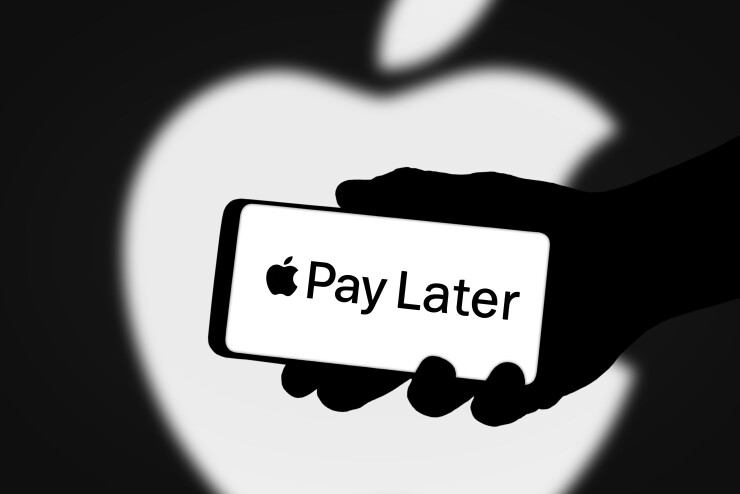
When Apple in 2022 announced plans to enter the booming buy now/pay later industry with Apple Pay Later following the pandemic-era success of BNPL fintech giants including Klarna, Affirm and Afterpay, it seemed to legitimize an industry still surrounded by fog.
With its deep pockets and ubiquitous reach to consumers and merchants via Apple Pay, the Cupertino, California-based technology firm appeared ideally positioned to extend BNPL loans to more users and retailers by leveraging agile new digital payments technology adaptable to online and in-store checkouts.
But Apple struggled with aspects of Apple Pay Later from the outset, first with a series of
Apple's revised approach to BNPL services may create opportunities for banks to streamline BNPL offers using the tech giant's payments rails, and could potentially provide a major market advantage for Affirm, which will be offered as a BNPL finance option to all Apple Pay users.
Apple Pay's menu will expand to include installment loans and an option to pay with rewards points through participating issuers' existing credit and debit cards.
The new services will roll out first with banks in Europe and Australia, followed by the U.S. where the ability to redeem rewards for a purchase with Apple Pay will launch first with consumers with a Discover Financial Services or Synchrony Bank credit card and with bank card issuers on Fiserv's platform.
Apple also announced BNPL giant Affirm will enable consumers to apply for loans directly through Affirm via Apple Pay beginning later this year. Apple did not provide comment by deadline.
The occasional failure of any Apple product tends to attract much attention, but the flame-out of Apple Pay Later should also be a warning to all players in the BNPL industry, according to some analysts.
"Apple has experienced some bumps with the failure of Apple Pay Later, plus their recent U.S. consumer financing moves, including the
Apple may salvage its investment in Apple Pay Later by handing BNPL services off to partners that are better suited to support it, but the challenges Apple faced in the industry still exist for other BNPL providers who are now facing tighter regulatory scrutiny and potentially higher operational costs as the
Apple Pay's model is also
And banks that may opt in to support BNPL loans through Apple Pay should be wary of the company's strategy that never fails to prioritize its own profits. "Banks need to use discipline when dealing with Apple. Sure, their account base and ecosystem are notable, but bankers need to think of their bottom line as much as Apple does. Aligning with Apple in credit cards didn't work for a well-run legacy player like Barclays or even a promising, well-funded new entrant like
Michael Abbott, Accenture's banking lead, said that with the recent CFPB direction that BNPL loans are credit, the momentum in BNPL is likely to shift toward banks.
"Ultimately the big tech companies don't want to get into banking—it's highly regulated and the growth rate is limited by [their] return on equity," Abbott said.
The troubles with
From the outset, Apple Pay Later had several unique — and potentially limiting — features. The service was only available by invitation to certain users for months. While other large BNPL providers including Klarna, Affirm and PayPal offered a range of repayment options, Apple Pay Later exclusively offered zero-interest short-term installment loans repayable in four equal installments over six weeks for purchases from $50 up to $1,000.
In another departure from industry norms, Apple vowed to report all borrowing activity to credit bureaus, which set it apart from rivals that typically approve loans without pinging credit bureaus. That could have dampened potential user interest because the ability to safeguard credit scores when taking out a short-term BNPL loan has been key to the products' popularity.
Apple was also directly funding Apple Pay Later loans, and even with the technology giant's deep pockets and the loans' short terms and relatively low maximum loan, the service still created risk and uncertainty for Apple in an area where the firm had no experience.
While Apple Pay Later could be seen as a streamlined way for Apple to provide installment and promotional financing for its own products, the company didn't necessarily need it. At the time the service launched, Apple already had a robust relationship with
The BNPL industry is also rapidly maturing and becoming more competitive, which will affect the fortunes of existing players, according to Nandan Sheth, CEO of Splitit, a fintech that enables merchants to offer installment loans at the point of sale from their existing credit cards, without originating new loans.
"Originating instant loans at the point of purchase is risky [for non-financial firms], creating greater write-offs compared to card-linked installments where there is a prior relationship between the lender and the card customer," he said, noting that banks have the lowest cost of capital in the consumer finance industry and banks have been rapidly expanding their own BNPL offerings in the last couple of years in response to fintechs' activity in the arena.
"It's becoming harder to be profitable in a more competitive BNPL market," Sheth said, noting that leading BNPL providers like Affirm and Klarna that are adding interest-bearing loans to their product mix are at a disadvantage with banks because of their higher cost of capital from third parties.
Apple's revised BNPL model, inviting banks to extend BNPL loans to consumers through issuers, is not without challenges, he noted.
"Apple's expansion into card-linked installments involves an issuer-by-issuer integration model, requiring them to individually onboard customers which entails significant technical demands for issuers. Consequently, this approach offers limited conversion benefits for merchants, as the installment plan is likely to be initiated post-purchase," Sheth said.






